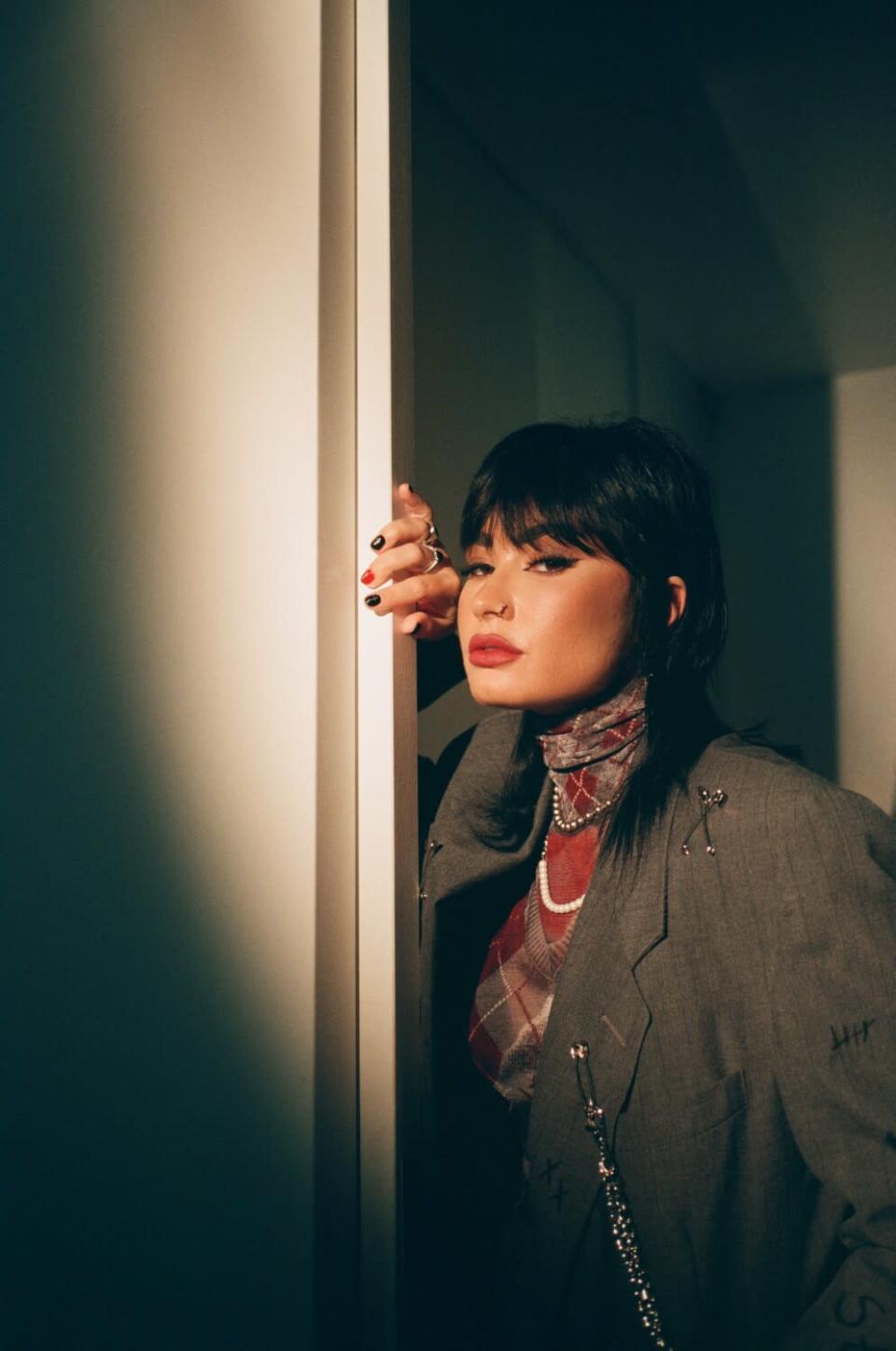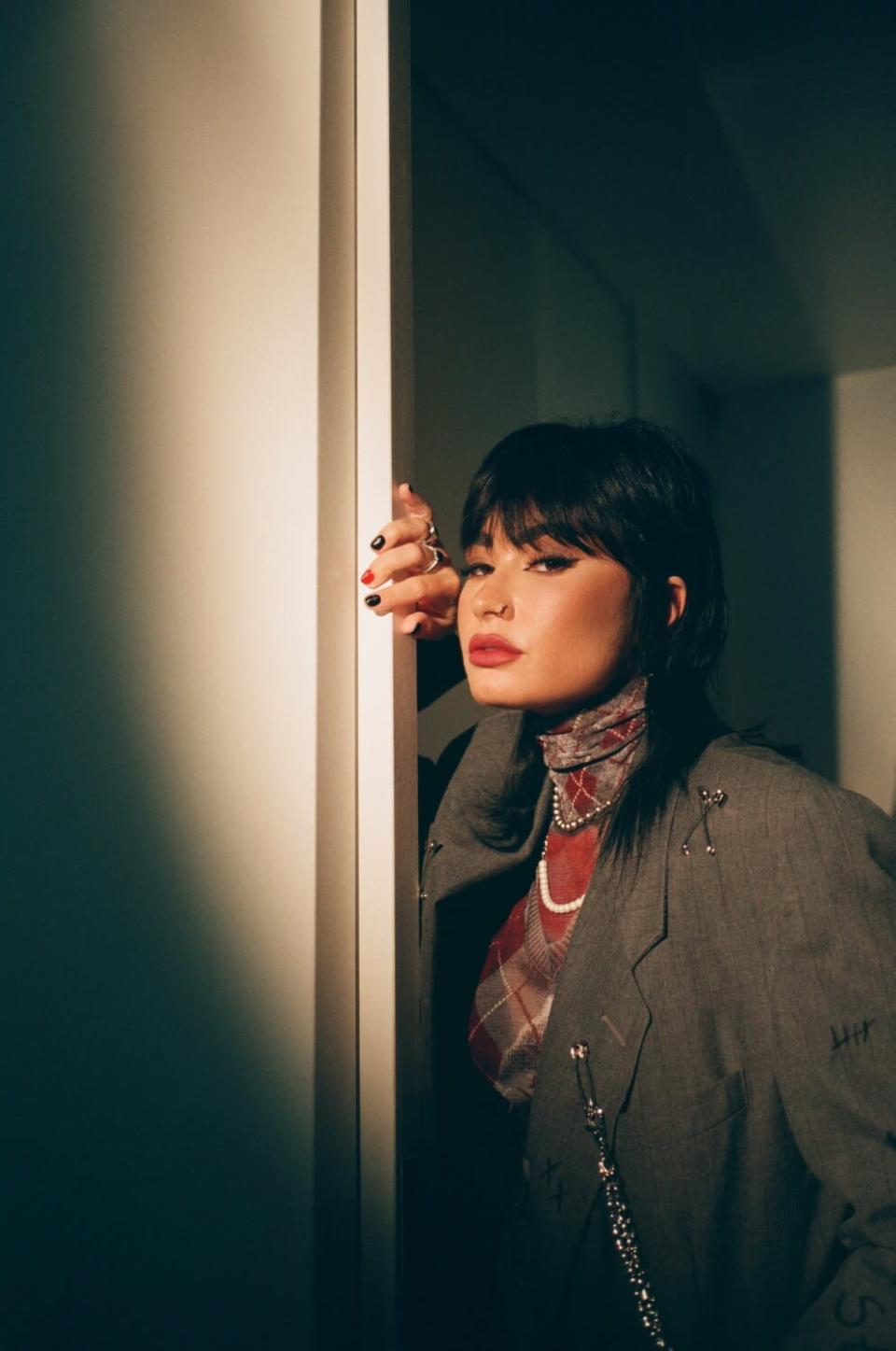For the record:
11:38 a.m. Aug. 18, 2022: An earlier version of this article said Lovato is 30. She will turn 30 on Aug. 20. It also said a photo of the singer with representatives from her record label and management team was taken in New York; the shoot was in Los Angeles.


In January 2022, a month after her most recent stint in rehab, Demi Lovato drove the final stake into the heart of her child-star past.
At her home studio in Los Angeles, Lovato posed for a photo with representatives from her record label and management team, led by Scooter Braun, who were all, incidentally, dressed in black. At the center of the picture sat Lovato, raising two middle fingers to the camera; “a funeral for my pop music,” she captioned the image on Instagram.
Almost eight months later, inside a black-box rehearsal studio in Burbank, Lovato quietly strums a cream-shellacked Gibson electric guitar, her face obscured under her Joan Jett shag cut. Gothic crosses dangle from her ears; she wears a loose pinstripe blazer with a leather-studded collar and shiny Creeper shoes to match. She picks at one of several growing holes in her mangled fishnet stockings.
“They’re supposed to look like this,” she says with a grin.
It’s the grunge-glam aesthetic that the Grammy-nominated hitmaker, who turns 30 on Aug. 20, has been jonesing to try for ages, at least since she first belted out pop-punk-flavored show tunes with the Jonas Brothers in the 2008 Disney Channel movie “Camp Rock,” eventually empowering fellow Disney performers like Miley Cyrus and Olivia Rodrigo to channel their inner rock stars and pick up guitars.
Lovato, whose every album has cracked the top five on the Billboard 200, is embracing her shadow side on her new LP, “Holy Fvck,” out Aug. 19. It’s a thundering, hard-rock horror maze through Lovato’s psyche as a superstar in recovery — not just from drugs and alcohol but also from the sexual and spiritual repression that had long eaten away at her sense of self.
When we meet, Lovato appears healthy and content, though slightly fatigued from a recent bout with COVID-19. She’s practically buzzing in anticipation for the album and her first tour in four years, which will feature gritty versions of pop hits like “Sorry Not Sorry” and “Heart Attack.”
“You can’t have light without dark,” she says. “The dichotomy was really important to me, and I had to take my anger out of the shadows in order to heal. I am owning my dark side, and it doesn’t have to take me down.”
[embedded content]
Lovato’s road to stardom has been riddled with obstacles. From the time she was 18, the singer-actor has bounded in and out of treatment programs for drug addiction, bulimia, self-harm and trauma stemming from at least two instances of sexual assault.
She addressed the cycle most acutely on her 2021 double album, “Dancing With the Devil … the Art of Starting Over,” and its associated YouTube documentary series, which detailed the near-fatal 2018 drug overdose that curtailed Lovato’s last tour. Triggered by a cocktail of oxycodone laced with fentanyl, Lovato suffered a heart attack, multiple strokes and brain damage that left her legally blind.
Against the advice of her friends, including pop legend Elton John, Lovato opted to become “California sober,” an approach that accommodates the use of cannabis and moderate alcohol intake. She recalls thinking when she wound up back at a treatment center last November: “I always take it too far. This is the last time. I’m not doing this again.”


Lovato was born in Albuquerque to Dianna De La Garza, a former Dallas Cowboys cheerleader, and Patrick Lovato, a musician and audio engineer of Hispano descent. They divorced when Demi was just 2 years old; her father, prone to violent outbursts and substance abuse, remained estranged from his children until he died of cancer in 2013. Her mother, who later remarried, moved young Demi and her older sister to Dallas.
Lovato began a demanding regimen of dance, drama and music classes; she also competed on the child beauty pageant circuit. In 2002, she starred as Angela on the children’s show “Barney and Friends” and eventually played the lead in Disney Channel originals like the show “Sonny With a Chance” as well as the “Princess Protection Program,” which co-starred Selena Gomez, and “Camp Rock.”
Meanwhile, Lovato struggled with bullies in school, to the point where she withdrew and completed her high school diploma at home. Depressed and reeling from the trauma of a rape she said occurred when she was 15, Lovato developed a cocaine habit, which she has said was enabled by promoters, and began cutting herself. “There are things that happened within that time that I’m still overcoming,” she says.
Once the “Camp Rock” soundtrack soared to No. 3 on the Billboard 200 chart, Lovato was tapped by Disney label Hollywood Records to unleash her pop-rock potential on two records: 2008’s “Don’t Forget” and 2009’s “Here We Go Again,” which charted at No. 2 and No. 1, respectively. “Who says I can’t wear my Converse with a dress?” Lovato sang defiantly in her first solo hit, 2008’s “La La Land” — a battle cry against the stringent parameters of both girlhood and child stardom.
While writing those early records, she sank her teeth into the tortured melodrama of acts like emo mainstays Paramore, Christian metal band Flyleaf and the pop-rock singer Kelly Clarkson, whose songs Lovato wore out in the privacy of her headphones. From them, Lovato learned to throw her body into her otherwise supple voice, suffusing every peak and valley of a song with a magnitude fitting for rock.
“Back when I worked on Disney Channel, I knew I could go this hard,” says Lovato. “But it wasn’t until recently that I felt like I could accomplish this sound. I’ve had a lot of anger since coming out of treatment. These new songs are about taking the power back and owning my anger — something I pushed aside for years, because I thought it would make me less spiritual.”


“Holy Fvck” is rich with Biblical references and subversions of the choir girl she used to be while attending Baptist church in her teens — until, she says, she was pushed out of the choir after dating, then dumping a pastor’s son. “And he cheated on me!” she exclaims. “But oh, now I’m blacklisted from performing because of something someone else did? It was the first time I felt betrayed by the church.
“I don’t believe in organized religion anymore,” she adds. “My God is the universe. It’s so much bigger than me, or us.”
On “Holy Fvck,” the battle between Lovato’s sexual agency and her Baptist upbringing coalesce into an emotional maelstrom. Amid the industrial goth-rock churn of “Heaven,” Lovato sings of choosing pleasure over piety: “Crucified for the life I’m living / Oh my god hope I’m forgiven / Going to hell ’cause it feels like heaven.”
“It’s actually based on a Bible verse,” explains Lovato. “Matthew 5:30 says, ‘If your right hand causes you to sin, cut it off; [for] it’s better to lose one part of your body than your entire body to hell.’ That was a Bible verse I heard since I was young — too young to know what masturbation was. And now, I have my own [line of] sex toys. Masturbation can be a form of self-care, it’s not something to be ashamed of at all.”
For all its blasphemy, this is relatively light conversation for Lovato, who was 22 years old when she released her 2015 try-sexual anthem, “Cool for the Summer,” a maximalist (and Max Martin-assisted) pop smash about exploratory sex between friends of the same gender.
[embedded content]
The lead single from her first Grammy-nominated album, “Confident,” the song peaked at No. 11 on the Billboard Hot 100 and experienced a renaissance on the charts once more this spring when it went viral on TikTok. While the song was dismissed by some critics as “pandering” to the LGBTQ community, it was heavily circulated on many a Pride Month playlist, and it made for one of the strangest lip-sync battles in season 9 of “RuPaul’s Drag Race.”
“I came out to the world with a hit song, which was pretty cool,” says Lovato, who now describes her sexuality as pansexual and her gender identity as nonbinary. Lovato says she’s adopted both “she” and “they” pronouns to reflect her fluidity in presentation; the line, she says, is drawn at the “constricting leotards and stilettos” she used to wear during her performances.
“I did my exploring when I was a teenager, but I wasn’t clear on [sexuality] until I was about 24,” she says. “I think the reason was [that] the church instilled in me that it was wrong, and I hated that.”


Lovato spent some of the pandemic swiping between girls and guys on dating apps. “I found that dating women was harder for me, because many were just exploring or confused about their sexuality,” she says. Though she was recently reported to be in a relationship with a male musician, she declined to share any details.
Given that she’s released three documentaries detailing the contours of her personal life, she says she’s practicing the art of being a more private person — something she never learned during her two decades in the limelight.
“I’ve reached a point where I’m tired of spoon-feeding myself to the media about my journey with sobriety,” she says. “‘This is where I’m at.’ ‘This is where I went for a month.’ ‘These are my pronouns and this is who I am.’ F— it. I’m putting myself out there and that’s what people should appreciate. And the ones that don’t can f— off. I’m tired of explaining myself. I’m so tired. With all due respect, I’m not going to answer questions that I don’t want you to know. And I think that’s an empowering place to be, when I’ve shared everything with everyone my whole life.”
Grammy-nominated country songwriter Laura Veltz, 42, who’s previously penned hit songs for Maren Morris and Dan + Shay, co-wrote 12 of the 16 songs on “Holy Fvck.”
It seemed an unlikely pairing at first, until the songwriter — a Nashville-based mom of three whose arms are adorned with botanical tattoos — realized she was sorting out her own tangled relationship with the music biz on songs like “Eat Me,” a brackish kiss-off to the sexist demands of the media and entertainment industries. (Lovato and Veltz co-wrote the song with alternative pop singer Royal & the Serpent.)
“We got real dark, like in the meat of what Demi was going through in recovery,” Veltz tells The Times over a video call. “One day, Demi came in with this idea like, ‘I can’t spoon-feed you anymore.’ I thought, ‘This is every woman — this is every disenfranchised person who’s been stuffed into a box the size of an inch and expected to thrive in that.'”


During Lovato’s most recent stint in treatment, no longer dissociating under the delirium of substances, she began a deeper survey of her personal boundaries, especially around intimacy. One formative experience bubbled up to the surface in new song “29” — a crushing rock ballad in which she marvels at turning the same age as a man she fell in love with when she was 17 years old.
“Thought it was a teenage dream / Just a fantasy,” she sings acerbically in the chorus: “But was it yours, or was it mine?”
“I didn’t understand it at the time,” says Lovato, who declined to name the ex who inspired the song. “I was like, ‘I just like older guys.’ And now I’m like, ‘Hey, that’s not OK. That’s weird!’”
With an increasing number of ex-child stars speaking out against the porous boundaries between adults and young talent — such as “iCarly” star Jennette McCurdy, who describes a hostile work culture within Nickelodeon in her new memoir, “I’m Glad My Mom Died” — Lovato feels justified in joining the chorus of dissent.
“I have a guy friend who relates to the song, who was with [a woman] in her 40s and was praised [for being the] younger guy,” says Lovato. “Culturally, I love that it’s changing now. I love that people are being held accountable for it. I hope they can take what I’ve learned so that they can protect themselves.”
“The writing of the music was like therapy,” says Veltz. “Every day Demi would come in with something so truthful, there was nothing goosed up about her lyrics. The idea of some ad wizard at the top deciding that Demi is going to do rock now is so not true. … I’ve never seen a person transform the way I’ve seen Demi transform during the process of getting these feelings out.”
Guitarist Nita Strauss — ranked No. 1 on Guitar World’s list of “10 Female Guitar Players You Should Know” — recently wrapped an eight-year run in Alice Cooper’s touring band to back Lovato in support of “Holy Fvck” this summer and fall. Strauss, 35, lauds Lovato not just for hiring an all-woman band for the job but also for advancing the cause of women and gender-nonconforming people in rock.
“I think [rock fans] want sincerity,” says Strauss. “They don’t want somebody coming in, wearing a Metallica shirt once and making a quick buck. Once people see that this music is truly raw and real, and from Demi’s heart and soul, I think they will embrace her. There’s no fluff, no bubblegum about it.”
Lovato and her band will touch down in Los Angeles on Sept. 28 at the YouTube Theater.
“Everyone has their own mess,” says Lovato. “I just happened to be really public about mine, because my life has been under a microscope since I was a teenager. There’s a mess in everyone’s closet. But if you can take your mess out of the closet and start to piece yourself back together? That’s growth.”
This story originally appeared in Los Angeles Times.




